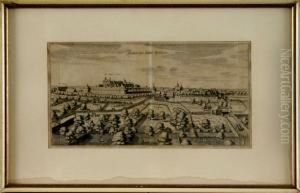Johann Matthaus Von Merian Paintings
Johann Matthäus von Merian, more commonly known as Matthäus Merian the Elder, was a notable Swiss-born engraver and publisher who made significant contributions to the world of printmaking in the early modern period. Born in Basel on September 22, 1593, Merian came from a family deeply involved in the arts; his father was an engraver and publisher, which provided Merian with an early exposure to the craft. At a young age, he moved to Zürich to begin his training, and his talent and dedication soon led him to further his studies in Paris and then in Strasbourg under the guidance of the renowned engraver and publisher Johann Theodor de Bry, who was also his father-in-law.
Merian's work is characterized by its detailed and precise engraving technique, contributing to various fields such as topography, history, and especially natural history. In 1626, he took over the publishing house of his father-in-law in Frankfurt, from where he published his most famous work, the 'Topographia Germaniae'. This extensive collection of town plans and views across Europe, particularly of the Holy Roman Empire, was groundbreaking in its scope and accuracy, providing valuable insights into the urban and rural landscapes of the 17th century.
Aside from his topographical works, Merian is also remembered for his 'Theatrum Europaeum', a comprehensive chronicle of contemporary historical events, and the 'Metamorphosis Insectorum Surinamensium' (Transformation of the Insects of Surinam), in which he documented the wildlife of Suriname in exquisite detail. This latter work was partially published posthumously by his daughter, Maria Sibylla Merian, who was also an accomplished artist and scientist, indicating the continuation of the family's artistic legacy.
Merian's influence extended beyond his lifetime, with his works being highly sought after by collectors and scholars for centuries. His ability to blend artistic skill with scientific observation made him a pioneer in his field, contributing significantly to the development of early modern printmaking and publishing. Johann Matthäus von Merian died on June 19, 1650, in Langenschwalbach, now Bad Schwalbach, Germany, leaving behind a body of work that continues to be admired for its beauty and precision.
